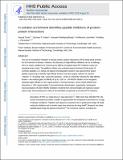In-solution enrichment identifies peptide inhibitors of protein–protein interactions
Author(s)
Touti, Faycal; Gates, Zachary P; Bandyopadhyay, Anupam; Lautrette, Guillaume; Pentelute, Bradley L.
DownloadAccepted version (1.381Mb)
Terms of use
Metadata
Show full item recordAbstract
The use of competitive inhibitors to disrupt protein–protein interactions (PPIs) holds great promise for the treatment of disease. However, the discovery of high-affinity inhibitors can be a challenge. Here we report a platform for improving the affinity of peptide-based PPI inhibitors using non-canonical amino acids. The platform utilizes size exclusion-based enrichment from pools of synthetic peptides (1.5–4 kDa) and liquid chromatography-tandem mass spectrometry-based peptide sequencing to identify high-affinity binders to protein targets, without the need for ‘reporter’ or ‘encoding’ tags. Using this approach—which is inherently selective for high-affinity binders—we realized gains in affinity of up to ~100- or ~30-fold for binders to the oncogenic ubiquitin ligase MDM2 or HIV capsid protein C-terminal domain, which inhibit MDM2–p53 interaction or HIV capsid protein C-terminal domain dimerization, respectively. Subsequent macrocyclization of select MDM2 inhibitors rendered them cell permeable and cytotoxic toward cancer cells, demonstrating the utility of the identified compounds as functional PPI inhibitors. Keywords: chemical libraries; chemical tools; peptides; screening
Date issued
2019-03-18Department
Massachusetts Institute of Technology. Department of Chemistry; Koch Institute for Integrative Cancer Research at MITJournal
Nature Chemical Biology
Publisher
Springer Nature
Citation
Touti, Fayçal et al. "In-solution enrichment identifies peptide inhibitors of protein–protein interactions." Nature Chemical Biology 15, 4 (April 2019): 410–418 © 2019 The Author(s)
Version: Author's final manuscript
ISSN
1552-4450
1552-4469